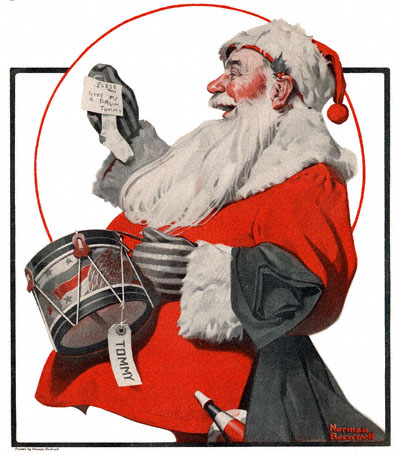I have been tagged twice over with the dreaded Christmas meme by Shane and Sean; thus coercing me into doing a goddamned Christmas post…”You’re a mean one…Mr. Zenpundit…”.
The rules are as follows:
1. Link to the person that tagged you, and post the rules on your blog.
2. Share Christmas facts about yourself.
3. Tag seven random people at the end of your post, and include links to their blogs.
4. Let each person know that they have been tagged by leaving a comment on their blog.
1. Wrapping or gift bags?
My personal history speaks of incompetently and downright oddly wrapped packages that look like a form of Ape may have also kicked the gift around the primate house for a few hours. Mrs. Zen has therefore relieved me of such duties to spare herself personal embarrassment at family gatherings.
2. Real or artificial tree?
Real tree. Always. I have fond memories from my boyhood of my father chain-smoking and swearing like a NCO, trying to fit some gnarled trunk into the tree stand with the aid of a hacksaw, a hammer and one of my mother’s sharper kitchen knives. I knew that when I heard the words ” YOU….MOTHER….BASTARD!!!” thundering down the hall that the time to trim the tree was not far off.
3. When do you put up the tree?
It varies. This year we put it up a week ago and…like my father of old….I had to get out a saw.
4. When do you take the tree down?
In recent years after New Year’s Day. I confess to having once waited so long that I threw out a tree that was in mid transition between green and brown. Once on the curb it spontaneously burst into flames.
5. Do you like egg nog?
Yes. Don’t be knocking the Nog around me.
6. Favorite gift received as a child?
One year, in the era of “Pong” but prior to the advent of Atari I received some kind of primitive tank video game that we plugged into an old black and white television. Despite the graphics amounting to objects being represented a few big pixels, it was briefly the talk of the neighborhood until after playing it for four or five hours straight it shorted out and smoked.
7. Do you have a nativity scene?
No. My grandmother did, I believe.
8. Worst Christmas gift you ever received?
My father’s widely disliked second wife ( he is now on # 3) once gave me and my 1st wife a large ceramic pig. As there could be no discernable reason for this gift other than as an editorial statement, I re-gifted it to her on her next birthday. She got the message.
9. Mail or email Christmas cards?
Mail but I have been remiss in doing so this year.
10. Favorite Christmas Movie?
“It’s a Wonderful Life” and that claymation ‘toon with Burgermeister Meisterberger
11. When do you start shopping for Christmas?
“Twas the night before Christmas….” which is why Mrs. Zen has relieved me of this task as well.
12. Favorite thing to eat at Christmas?
The big holiday dinner in its entirety.
13. Clear lights or colored on the tree?
Colored and preferably twinkling.
14. Travel at Christmas or stay home?
Home.
15. Open the presents Christmas Eve or Christmas Morning?
Both. Big day is Christmas.
16. Most annoying thing about this time of year?
The woman today with the enormous behind who got into her minivan and almost backed into me ( me, not my automobile) and then gave me the finger. I pointed and laughed at her which seemed to cause her some degree of distress.
I tag the following lost souls:
MountainRunner
Lexington Green
The Lounsbury
Dave Schuler
Tom Barnett
Chirol
Jeremy Young



 . The editors explained their choice in a way that also attempted to articulate Putin’s stabilitarian “siloviki ideology”:
. The editors explained their choice in a way that also attempted to articulate Putin’s stabilitarian “siloviki ideology”: everybody who wanted a glorious France; his cabinet included Jacobin Terrorists, Monarchists, Girondins, aristocracy, bourgeosie and the chameleon-like
everybody who wanted a glorious France; his cabinet included Jacobin Terrorists, Monarchists, Girondins, aristocracy, bourgeosie and the chameleon-like 

